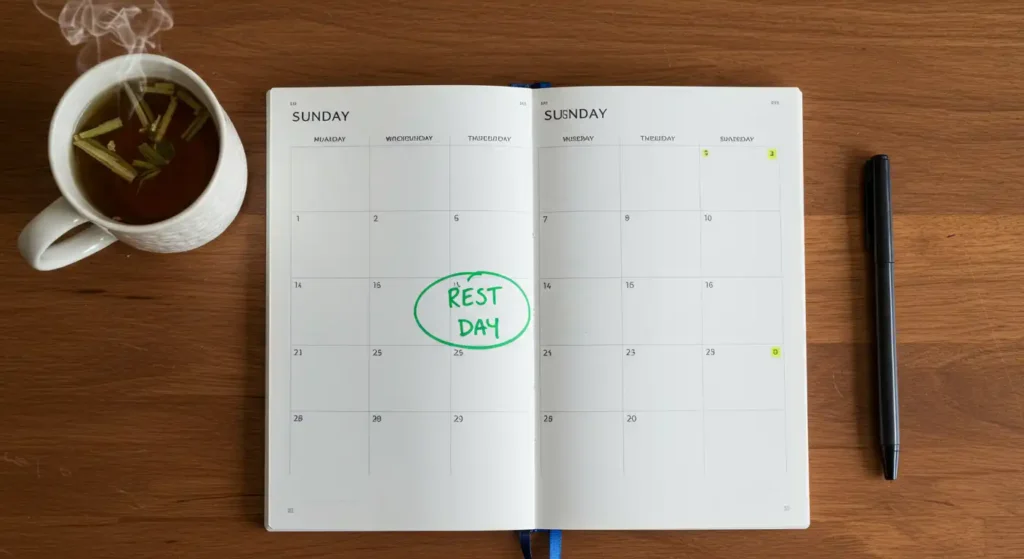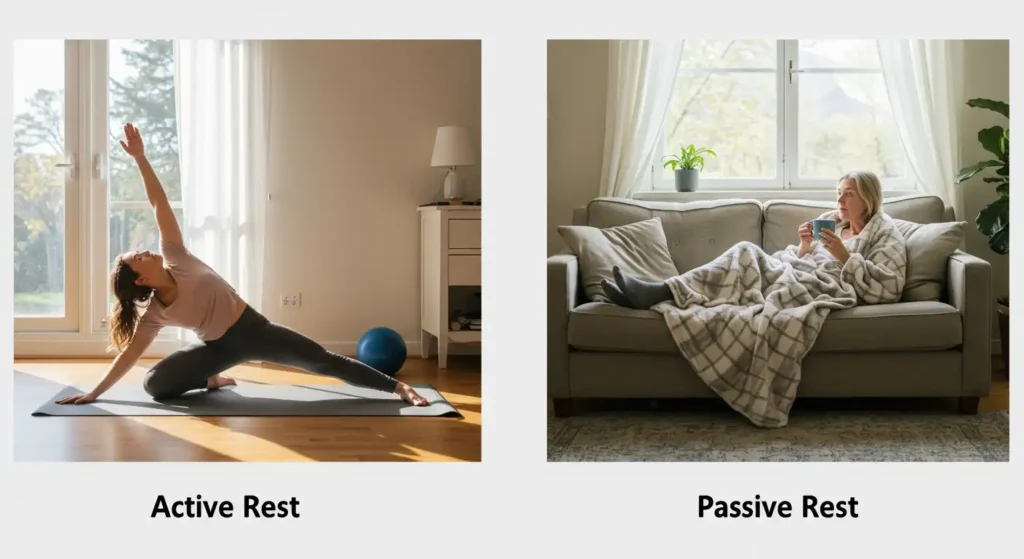You push through busy days, juggling work, family, and goals. But your mind feels foggy sometimes. That’s where rest days come in. They help clear the mental clutter. As someone with over seven years writing about health and wellness, I’ve seen how skipping rest harms focus. I once burned out from non-stop content creation. Now, I prioritize rest days for mental clarity. It changed everything for me.
Rest days aren’t lazy excuses. They recharge your brain like a phone battery. Without them, you risk exhaustion. Consider your mind to be a muscle. It needs recovery to stay strong. Rest days for mental clarity build resilience. Rest days avert busyness in our busy society.
What Do You Mean by Mental Clarity and Why Is It Important?
The mental clarity helps one think coolly and come up with the right decisions fast. You feel focused, not scattered. It aids you in performing day-to-day activities. Without it, small problems feel huge. You might forget things or snap at loved ones.

Many people chase productivity without rest. But that backfires. Your brain processes info better when rested. I remember a time I wrote articles daily without breaks. My ideas dried up. Adding rest days sparked creativity again. It showed me clarity drives success.
Clarity boosts your mood too. You enjoy life more. It reduces stress that clouds judgment. Prioritize it for overall well-being. Start small. Notice how rest improves your thoughts.
The Science Behind Rest Days for Mental Clarity
Science proves rest days enhance brain function. Exercise tears muscles, but rest heals them. The same goes for your mind. Stress hormones like cortisol rise without breaks. They fog your thinking.
Studies show downtime links ideas and boosts creativity. Your brain retrieves memories during rest. This builds self-connection. I’ve used this in my writing career. After rest, my articles flow better.
Another key point: rest replenishes energy stores. Glycogen in muscles and brain depletes with constant activity. Rest days restore it. This fights fatigue. Research highlights breaks improve mood and concentration. You pay attention longer. Embrace the science. It empowers you to rest guilt-free.
Deep rest transforms health. Nature time or hobbies calm the mind. They benefit mental clarity. Avoid overtraining. It disrupts your nervous system. Rest keeps balance.
Symptoms That You are in Need of a Rest Day to Get Mental Clarity
Your body sends signals when rest is due. Listen closely. Constant fatigue is a big red flag. You wake up tired despite sleep. Tasks feel harder than usual.
Irritability creeps in next. Small annoyances explode. You snap at others without reason. I’ve felt this during intense SEO projects. A rest day calmed me right away. It restored patience.

Foggy thinking shows up too. You forget names or lose focus mid-sentence. Decisions drag on. Headaches or poor sleep follow. These signs scream for downtime. Don’t ignore them. Act early to avoid burnout.
Physical clues matter as well. Sore muscles or low energy persist. Your motivation dips. Recognize these. A day off can put things back in gear again very quickly.
Key Benefits of Rest Days for Mental Clarity
Rest days offer real perks for your mind. They reduce anxiety first. Stress melts away with breaks. You breathe easier.
Improved focus comes next. Your thoughts sharpen. Productivity soars after recharge. Experts note rest prevents injuries and builds strength. This applies to mental health too.
Better sleep is another win. Rest days regulate your cycle. You wake refreshed. Creativity sparks during downtime. Ideas flow freely.
Emotional balance improves. You handle ups and downs better. Empathy grows. I’ve shared this with readers for years. Rest builds resilience. It fights depression symptoms.
Overall well-being thrives. Your relationships strengthen. You show up fully. Embrace these benefits. They make life richer.
Reduced Stress and Burnout Prevention
High stress clouds mental clarity. Rest days lower cortisol levels. You feel calmer instantly.
Burnout sneaks up without breaks. It drains energy and joy. I’ve dodged it by scheduling rest. You can too. Start with one day weekly.
Prevention is key. Regular downtime stops overload. It keeps your mind sharp. Encourage yourself. You deserve this peace.
Better psychological abilities and memorizing
Rest boosts brain power. Memories consolidate during breaks. You recall info easier.
Cognitive rest links concepts. Creativity surges. Harvard research ties it to endorphin release. This uplifts mood.
I’ve noticed sharper writing post-rest. My memory improves. Try it. Watch your thinking transform.
Better Emotional Regulation
Emotions run wild without rest. Irritability rises. Rest days stabilize mood.
You respond thoughtfully. Not reactively. This builds stronger bonds. Feel encouraged. Small rests yield big emotional wins.
How to Incorporate Rest Days for Mental Clarity
Adding rest days is simple. Plan them weekly. Start with one full day off. Listen to your body. If tired, rest more. Tips from experts include gentle walks or yoga. Keep it light.
Active recovery works wonders. Stretch or meditate. Avoid intense tasks. I’ve built habits like journaling. It clears my mind.

Set boundaries. No work emails. Focus on joy. Hobbies recharge you. Nature walks boost clarity.
Track your progress. Note how rest feels. Adjust as needed. You are creating a fitter you.
Good Advice to Efficient Rest Days
- Sleep in if needed. Let your body recover naturally. It restores energy fast.
- Practice mindfulness. Practice meditation for 10 minutes. It calms racing thoughts.
- Consume healthy food. Eat fruits and vegetables. They fuel brain health.
- Disconnect from screens. Read a book instead. It reduces mental strain.
- Go outside. Fresh air clears fog. Walk in a park.
These tips come from my experience. They work for beginners. Try them. Feel the difference.
Active vs. Passive Rest: What Works Best?
Active rest involves light movement. Like yoga or swimming. It boosts blood flow. Passive rest means lounging. Nap or daydream. Both aid mental clarity.

Choose based on your needs. I mix them. Active for energy, passive for deep calm. Experiment. Find your balance.
Common Mistakes When Taking Rest Days
Many skip rest entirely. They fear falling behind. But this hurts long-term.
Over-scheduling rest days is another error. Fill them with chores. Keep them free.
Guilt trips ruin benefits. Remind yourself: rest is productive. I’ve learned this over years. It fuels success.
Ignoring signals leads to injury. Push through pain? Stop. Rest heals.
Avoid these pitfalls. Embrace rest fully. Your mind will thank you.
Overcoming Guilt and Making Rest a Habit
Guilt blocks rest for many. You feel unproductive. Shift your view. Rest builds strength.
Start small. One hour daily. Build to full days. Celebrate progress.
I’ve made rest a ritual. It sustains my career. You can habit-stack it. Pair with tea or music.
Encourage yourself kindly. You’re worthy of breaks. Habits form with patience.
Conclusion:
Rest days are crucial for mental clarity. They recharge your brain and prevent burnout. You’ve learned the science, signs, and tips. Now, apply them. Start today. Schedule your next rest day. Feel the fog lift. As a content creator with deep knowledge, I promise: it transforms life. You deserve sharp focus and joy. Keep going. Your clearer mind awaits.


